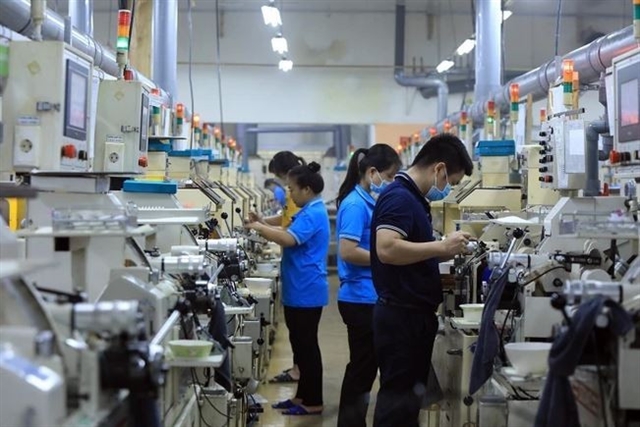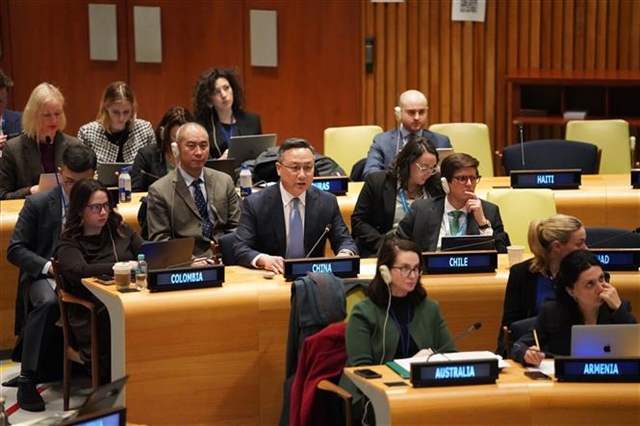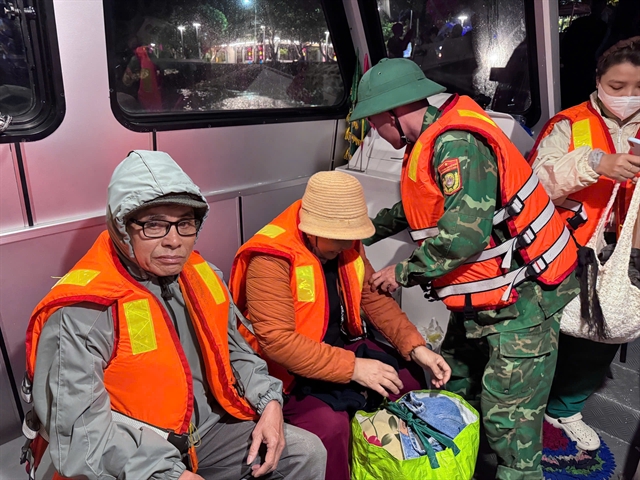 Society
Society

The number of fatalities due to COVID-19 was down by 30 per cent in HCM City last week thanks to the improvement in treatment of patients especially at home.
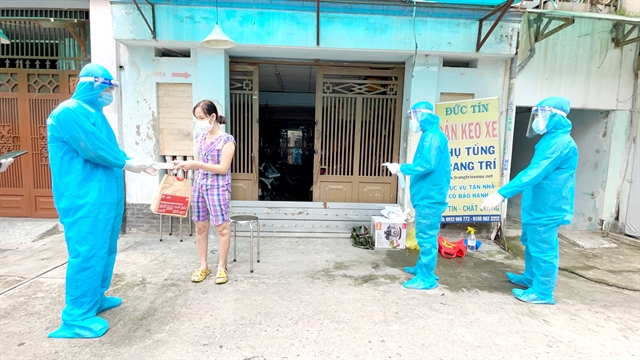
|
| COVID-19 patients being treated at home in HCM City’s Bình Thạnh District get medicines from local health officials. VNA/VNS Photo Đinh Hằng |
Gia Lộc
HCM CITY — The number of fatalities due to COVID-19 was down by 30 per cent in HCM City last week thanks to the improvement in treatment of patients especially at home.
The city's districts and communes have enough health workers, medicines, oxygen cylinders, and generators to efficiently treat patients at home.
After two weeks of getting treatment at home, five people belonging to a family in District 12 recovered.
N.H, 24, one of them, said: “My uncle was found to have COVID through mass testing at Tân Chánh Hiệp Ward where my family lives. Because his infection was mild, he was treated and isolated at home. Ward health officials delivered medicines to him immediately.”
A few days later she suffered from anosmia, or loss of smell, and tested positive herself.
And then three more people in the family tested positive. But they too had mild symptoms and were treated at home.
“At first we were anxious. But after getting detailed advice about the disease’s progress, how to treat it and what to do to help recover quickly from the ward health officials, the anxiety went away. They called us to ask about our health every two or three days.”
H.P, 28, of Bình Thạnh District also is also being treated at home because of her mild condition. She received medicines from local health officials and told how to use them.
“I felt assured about being treated at home,” she said.
P is among 92,355 COVID patients being treated at home as of September 4, according to the city Centre for Diseases Control and Prevention (HCDC).
The city administration has set up 520 mobile medical stations to monitor the condition of COVID patients treated at home.
The patients are provided with sufficient medicines and a hotline to local health officials, the HCDC said.
Speaking at press meeting on September 8, Nguyễn Hữu Hưng, deputy head of the city Department of Health, said more than 130,000 packs containing fever medicines, vitamins and anti-inflammatory drugs have been provided to local health stations.
Besides, more than 7,980 packs of the antiviral drug molnupiravir have been given to COVID patients, he said.
The department has petitioned the city People’s Committee to provide another 200,000 packs, he added.
Nguyễn Trần Bình, vice chairman of the District 11 People’s Committee, said besides the medicines provided by the department, the district’s 34 mobile medical stations which monitor 6,645 COVID patients at home also got donations of medicines and now have enough.
“Through the mobile medical stations, patients get medicines quickly.”
They also have enough doctors to monitor patients now unlike in the past after being provided more by the Military Medical Department.
“Effective treatment of COVID-19 patients at home helps prevent the disease from worsening. The district has seen a reduction in the transfer of patients to hospitals.”
Dr Lâm Phước Trí, head of the Tân Quý Ward medical station in Tân Phú District, said, “The ward has enough human resources, medicines, oxygen cylinders, and generators to treat COVID-19 patients at home.”
In August the ward got six health workers from the Military Medical Department, and the city’s Hồ Chí Minh Communist Youth Union dispatched volunteers to assist with administrative tasks, he said.
“When new COVID-19 patients are found, they are provided with medicines and told what they need to do. In the case of patients using the antiviral drug molnupiravir, we call them every day to ask about their health status and if there are side effects.
“As of now no one has any side effect. They have also recovered quickly.”
If COVID patients call his medical station hotline and report about a shortness of breath, Trí dispatches his emergency aid team along with oxygen cylinders and generators.
The ward currently has 500 patients at home, he added.
Field hospitals
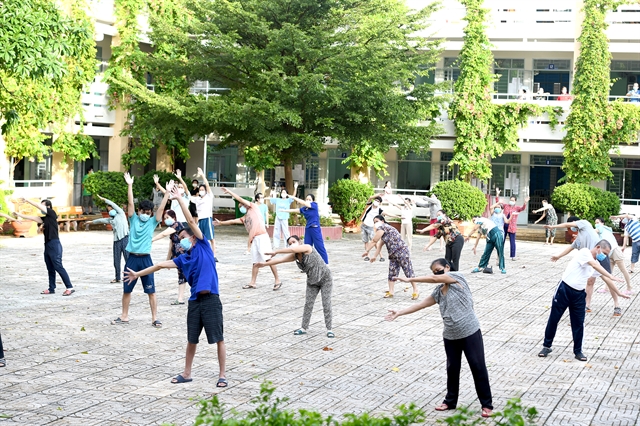
|
| COVID-19 patients do physical exercises at the Phú Nhuận District COVID-19 treatment field hospital No 1 in HCM City. Photo Courtesy of the HCM City Traditional Medicine Institute |
Field hospitals are carrying out a number of therapies and methods to improve their treatment efficacy.
At the Phú Nhuận COVID treatment field hospital No 1 at a high school in Phú Nhuận District, patients are treated using a regime called 4T- tinh thần (improvement of mental health), tập luyện (doing physical exercises), thức ăn (nutritious meals), and thuốc (medicine).
Its patients are all moderately ill but face a high risk of worsening because many of them are old and have underlying medical conditions.
They do physical exercises twice a day, in the morning and afternoon.
Dr Trần Minh Quang of the HCM City Traditional Medicine Institute, which manages the hospital, said: “Regular physical exercises help strengthen patients’ health and boost their immune system. Patients also do exercises to strengthen their respiratory muscles including the diaphragm, the rib cage muscles and the abdominal muscles.
“When these muscles are strengthened, they help enhance a patient’s breathing.
“Moreover, exercises help increase the blood circulation. This helps in the treatment of COVID-19 patients.”
The patients also get encouragement and detailed explanations about their disease status to mitigate their anxiety since mental well-being helps them recover rapidly, he added.
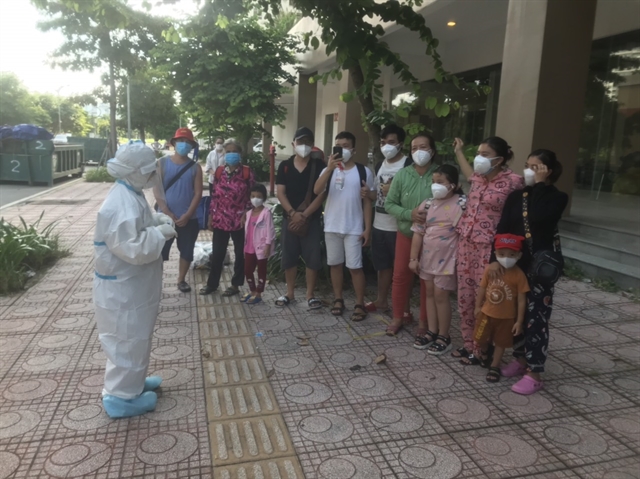
|
| A medical worker at the field hospital No 8 in HCM City tells people who have recovered from COVID how to take care of themselves at home. Photo Courtesy of the Bình Dân Hospital which manages the field hospital No 8 in the collaboration of Thống Nhất Hospital |
Patients at field hospital No 8, especially those with underlying medical conditions and seniors, are closely monitored to ensure they are treated in time if their disease worsens.
They are given the hospital’s hotline and added to its zalo group to ensure they get immediate assistance if their condition becomes worse.
Dr Lê Hoàng Văn of the hospital said, “Using these methods, the hospital’s doctors detect early which patients are at high risk of becoming worse and provide emergency aid in time.”
The hospital also has psychologists and counsellors to help mitigate the anxiety felt by patients and their relatives.
The Thủ Đức city COVID-19 Resuscitation Hospital, which admits severe patients, said providing early emergency treatment to patients whose condition worsens before being brought in it helps decrease the risk of death.
It has helped reduce the rate of fatalities from 39.8 per cent in July to 26 per cent in August, the hospital said.
The Department of Health has been increasing the supply of ventilators, dialysis machines, extracorporeal membrane oxygenation ( ECMO) machines, X-ray machines, PCR testing systems, beds with oxygen systems, and other medical equipment to COVID treatment facilities.
It has set up a team to efficiently transfer patients in severe condition from field hospitals to treatment facilities.
The city has 191 quarantine facilities with 35,369 beds to treat patients who cannot be left at home, 81 hospitals for moderately sick patients and 10 hospitals to treat the most severe cases.
Ten private hospitals are also treating patients.
Speaking at a meeting of the National Steering Committee for COVID-19 Prevention and Control, Minister of Health Nguyễn Thanh Long said the city has seen a significant decrease in new cases and deaths, pointing out that the number of deaths last week was down by 30 per cent.
Ministry statistics show that 200 people died on September 12 compared to 340 on August 22.
The Department of Health expects the number of discharged patients to be equal to or higher than the number of those hospitalised in the coming time. — VNS
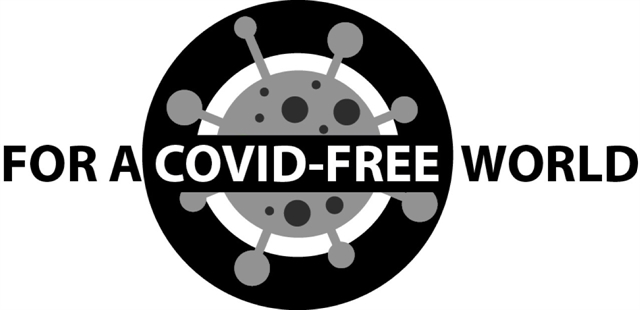
|



